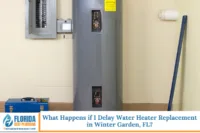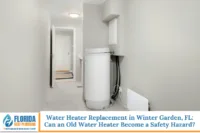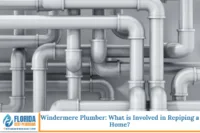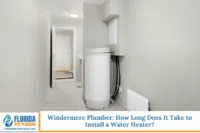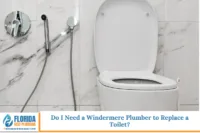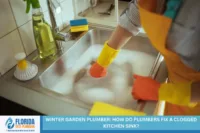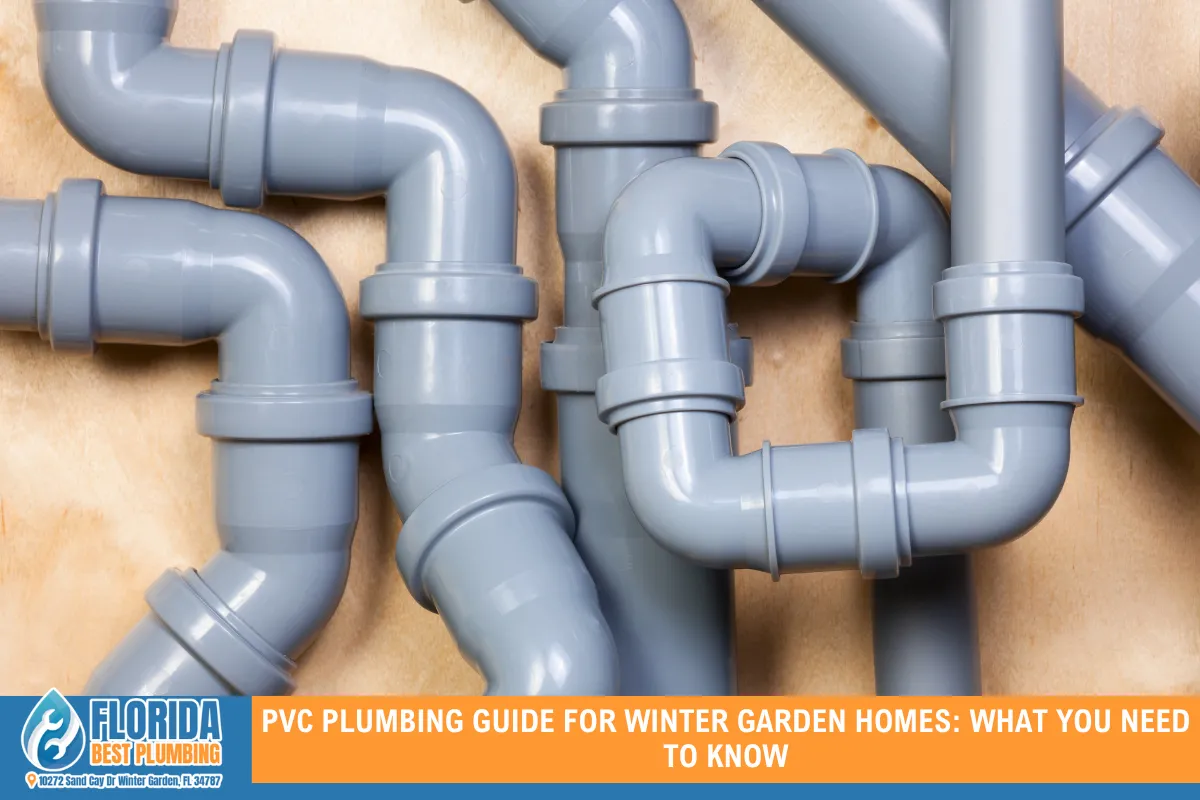
Why Plumbing Knowledge Matters for Every Winter Garden Homeowner
Plumbing plays a huge role in keeping any home functional, especially in a place like Winter Garden, FL, where the weather and soil conditions can put added stress on pipes. Most modern homes in this area use PVC piping systems for waste and drainage. Still, few homeowners understand how these systems work, what makes them reliable, and how local conditions can affect them.
This guide covers everything you need to know about PVC plumbing in Winter Garden—from its benefits and challenges to signs of trouble and long-term maintenance tips.
What Is PVC Plumbing and Why Is It Popular in Winter Garden?
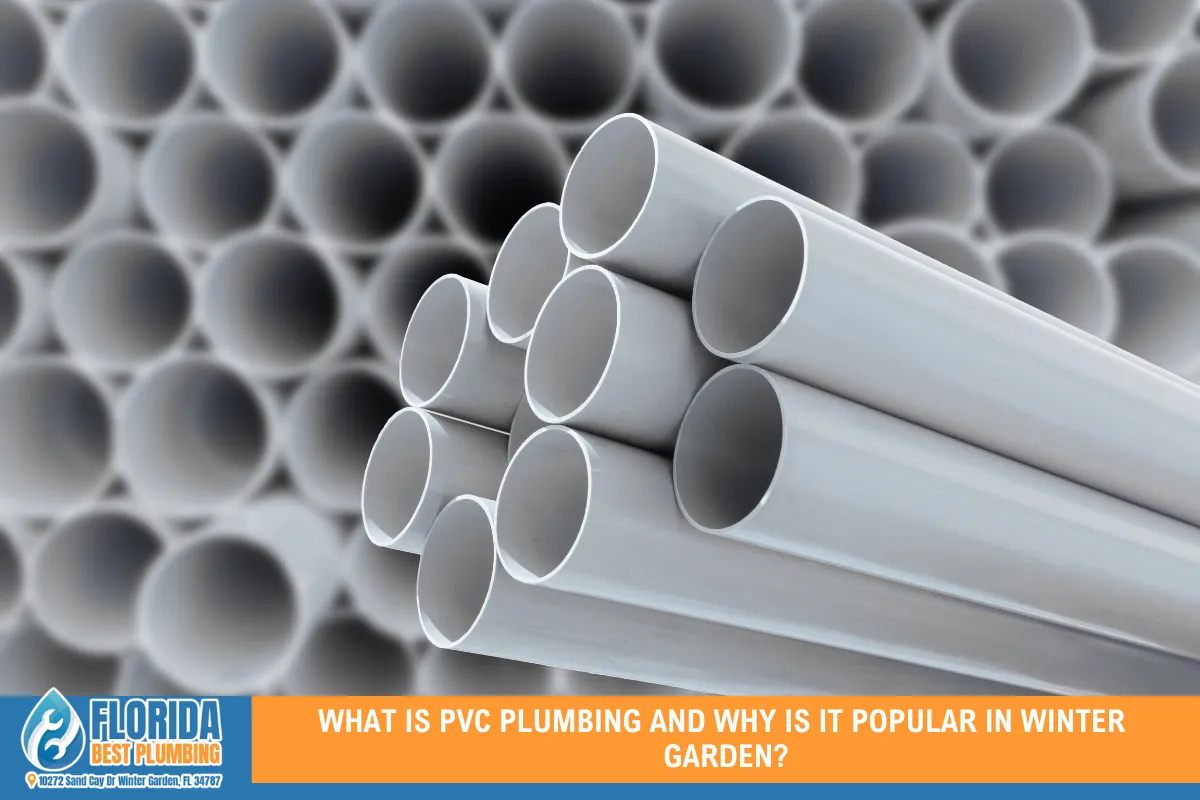
Understanding PVC in Plumbing Systems
PVC stands for polyvinyl chloride, a type of durable plastic commonly used in household plumbing, particularly for drain, waste, and vent lines. Unlike metal pipes, PVC doesn’t corrode over time, making it ideal for Florida’s humid and moisture-prone environment.
In Winter Garden homes, PVC plumbing is most often used in:
- Sewer lines
- Drainage systems
- Bathroom and kitchen waste disposal
- Irrigation setups
Why Winter Garden Homes Prefer PVC Pipes
PVC has become a top choice in Winter Garden plumbing installations because it’s:
- Affordable: Costs less than copper or galvanized steel.
- Low-maintenance: Doesn’t rust, corrode, or attract buildup like other materials.
- Long-lasting: When properly installed, PVC can last over 50 years.
- Easy to work with: Lightweight and simple to cut, glue, and assemble.
- Resistant to root intrusion: With correct sealing, PVC systems are better protected against tree roots than clay pipes.
How Florida’s Environment Affects Plumbing Systems
Climate Conditions in Winter Garden
Winter Garden is known for its subtropical climate. That means hot, humid summers, mild winters, and frequent rainstorms. While that weather might feel great for gardening and year-round outdoor fun, it presents several risks to your plumbing system:
- Temperature fluctuations can lead to pipe expansion and contraction.
- Heavy rainfall can saturate the ground, causing soil to shift around buried pipes.
- High humidity contributes to mold growth and joint deterioration if leaks go unnoticed.
The Role of Soil and Water Table
Homes in Winter Garden sit on sandy soil with a relatively high water table. This setup, while typical in Florida, puts underground plumbing at greater risk:
- Shifting soil can cause cracks in rigid polyvinyl chloride (PVC) pipes.
- Saturated ground adds external pressure on buried lines.
- Shallow installation depths increase exposure to environmental changes.
Common PVC Plumbing Issues in Winter Garden Homes
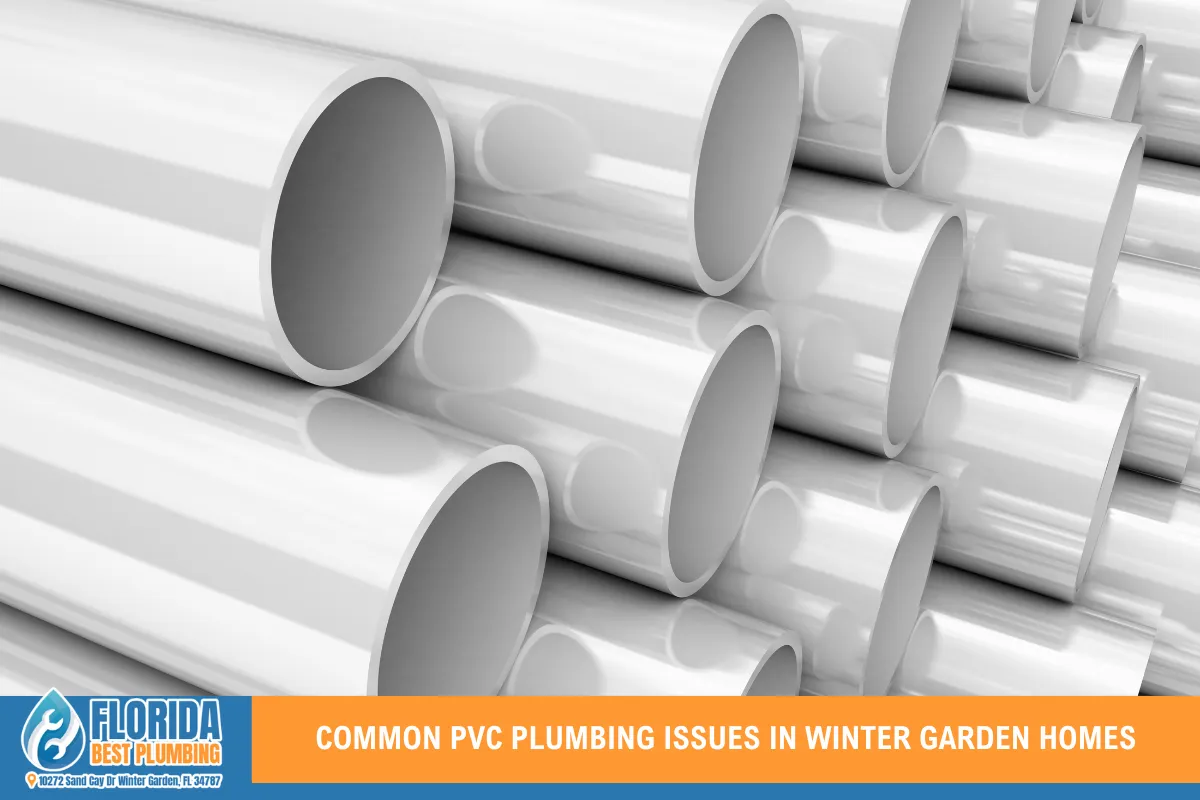
Pipe Movement and Expansion
Though durable, PVC isn’t immune to changes in temperature. The pipe material naturally expands and contracts with temperature changes, and in the Florida sun, even slight variations between day and night can strain joints and seals. Over time, this leads to:
- Loosened fittings
- Hairline cracks
- Leaks behind walls or beneath floors
Blockages from Roots and Debris
Lush landscaping is part of Winter Garden’s charm, but roots from large trees and shrubs will gravitate toward moisture, like what they find in a tiny PVC crack. Once inside:
- Roots expand, clogging the pipe.
- Wastewater backs up.
- Repairs often require excavation or pipe replacement.
Poor Installation and Low-Quality Materials
Not all plumbing installations follow best practices. In some older homes or DIY renovations, shortcuts may have been taken:
- Inadequate sealing with solvent cement
- Use of non-pressure-rated PVC for water lines
- No support straps, causing pipe sagging
These mistakes may not be apparent immediately, but can cause significant issues later on.
Identifying Plumbing Problems Before They Get Worse
Warning Signs to Watch For
Knowing what to look for can save you from big repair bills. If you notice any of the following signs, it’s time to take action:
- Unexplained puddles or water stains
- Slow-draining sinks or tubs
- Strange gurgling sounds from drains
- Sudden drop in water pressure
- Sewage odor inside or outside the home
Early detection is key. Many plumbing issues start small and silently escalate over time.
Plumbing Maintenance Tips for Winter Garden Homes
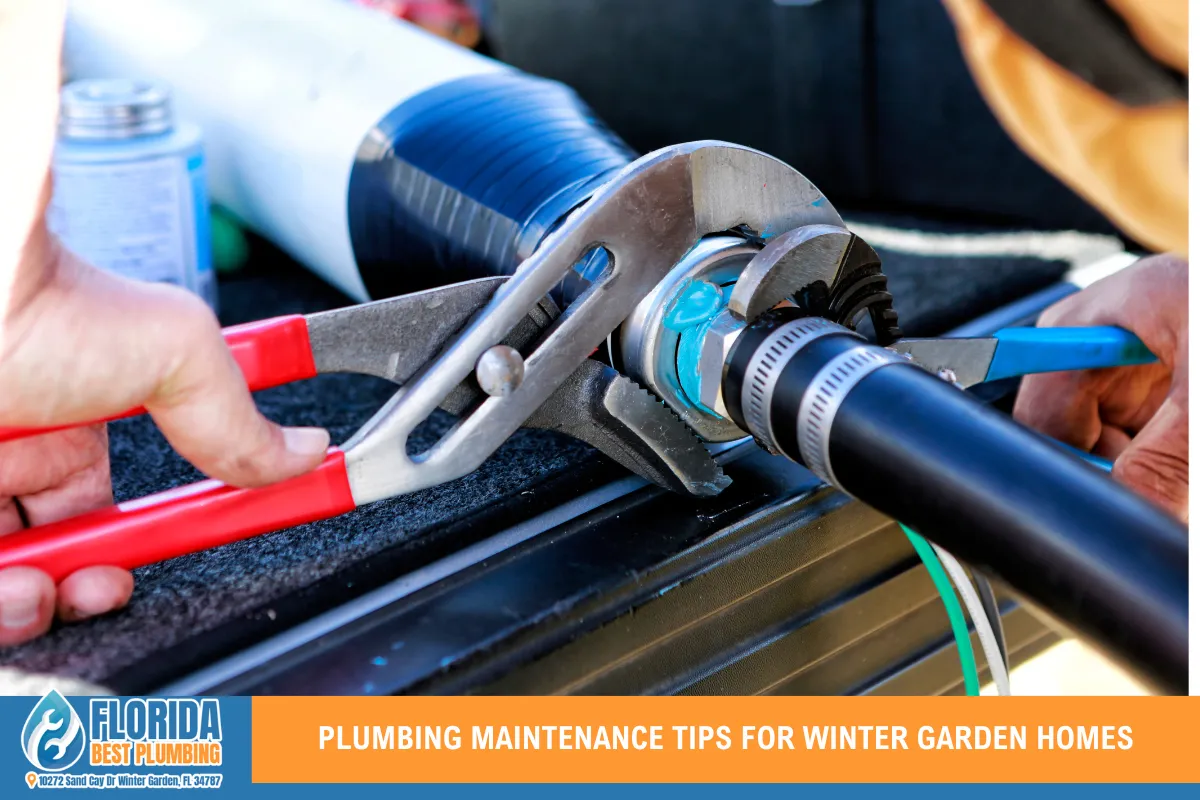
Keep Drain Lines Clear
Avoid flushing or pouring harmful materials down the drain. That includes:
- Cooking grease
- Coffee grounds
- Baby wipes
- Hair or stringy food waste
These items don’t break down easily and can stick to the inside of pipes, leading to clogs.
Perform Visual Inspections Regularly
Even without plumbing experience, you can visually inspect your system every few months:
- Look under sinks for signs of dripping or moisture.
- Check exposed PVC pipes in the garage, attic, or crawlspace for leaks.
- Walk your yard to spot unusual wet patches or sewer smells.
Insulate Exposed Pipes
Though rare, Florida’s occasional cold snaps can cause unprotected pipes to freeze and crack. Insulate any PVC pipes running along outside walls, in attics, or under outdoor sinks.
Schedule Routine Professional Checks
An annual plumbing inspection from a licensed expert can help:
- Detect hairline fractures in PVC
- Test for proper pressure
- Clean and camera-scope drain lines
- Spot issues in hard-to-see areas
Plumbing Upgrades to Consider in Winter Garden Homes
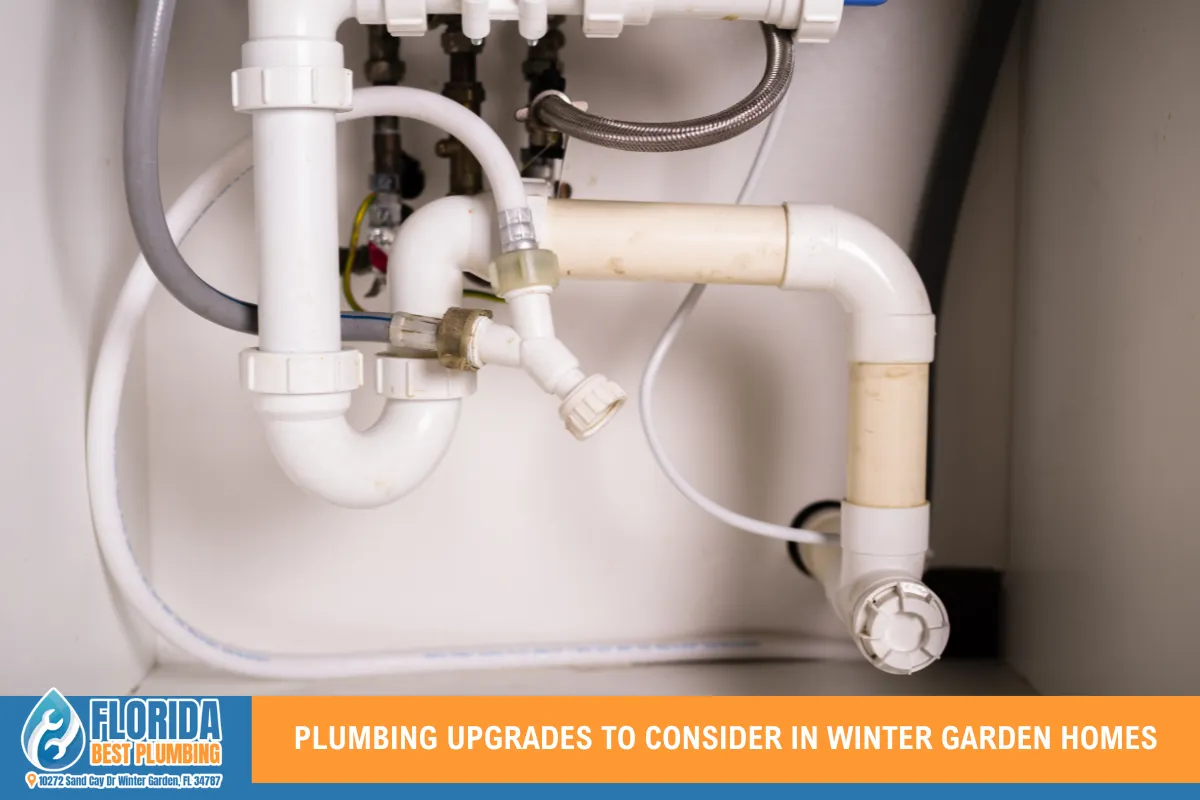
If you’re renovating or building in Winter Garden, here are a few smart upgrades:
- Install Schedule 40 or 80 PVC: These thicker, pressure-rated pipes provide better durability.
- Add cleanouts in strategic spots: Makes future maintenance faster and cheaper.
- Include air admittance valves (AAVs): These help with venting in tight or closed wall spaces.
- Use metal straps instead of plastic for support: Metal offers better stability in fluctuating temperatures.
Avoiding DIY Mistakes with PVC Plumbing
What Homeowners Can Handle Themselves
Some minor maintenance tasks are safe and effective if you’re comfortable using basic tools:
- Replacing P-traps under sinks
- Applying PVC primer and cement to replace short sections
- Installing or replacing hose bibs
What to Leave to the Pros
For anything beyond a simple pipe replacement or drain cleaning, it’s best to call a licensed plumber. Especially avoid DIY attempts with:
- Underground pipes
- Water heater installations
- Backflow prevention systems
- Pressurized water lines
Incorrect fixes can lead to leaks, code violations, or worse—burst pipes that flood your home.
Remodeling or Building? Keep Plumbing Front and Center
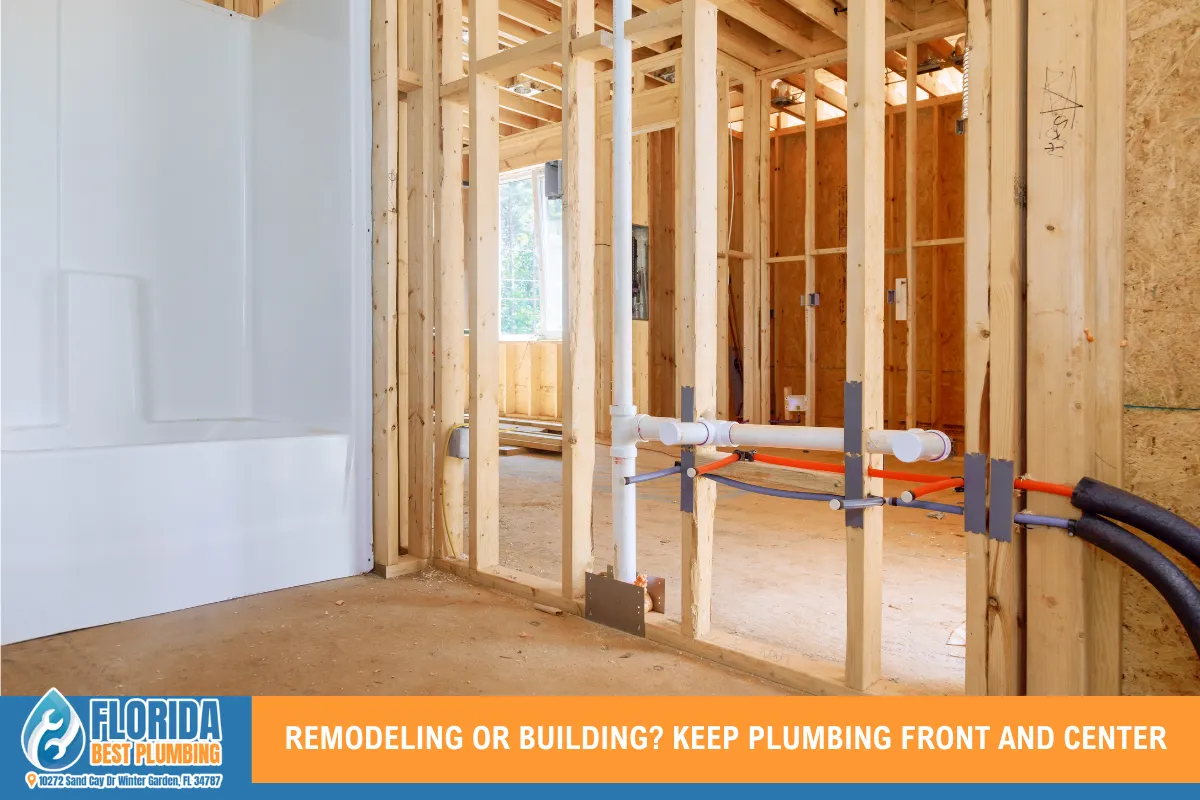
A remodel is the perfect time to future-proof your plumbing. Before walls go up or tile gets laid, ensure the following:
- All drain and vent lines are placed correctly
- Shutoff valves are accessible
- Irrigation systems don’t cross-contaminate the main supply
- Pipes are installed with a proper slope for drainage
This is your opportunity to correct any past plumbing shortcuts and prepare your home for the next 20 years or more.
Final Takeaways for Long-Term Plumbing Health
PVC plumbing is a reliable and cost-effective choice for homes in Winter Garden, but like any system, it requires proper care and maintenance. By staying informed and proactive, you can avoid major problems and enjoy a smoothly running home.
Whether you’re a new homeowner or have lived in Winter Garden for years, your home’s plumbing system deserves a regular check-up. Think of it as essential as changing your HVAC filters or checking your roof. Proper maintenance today means fewer emergencies tomorrow.
Winter Garden Plumbing – Florida Best Plumbing LLC
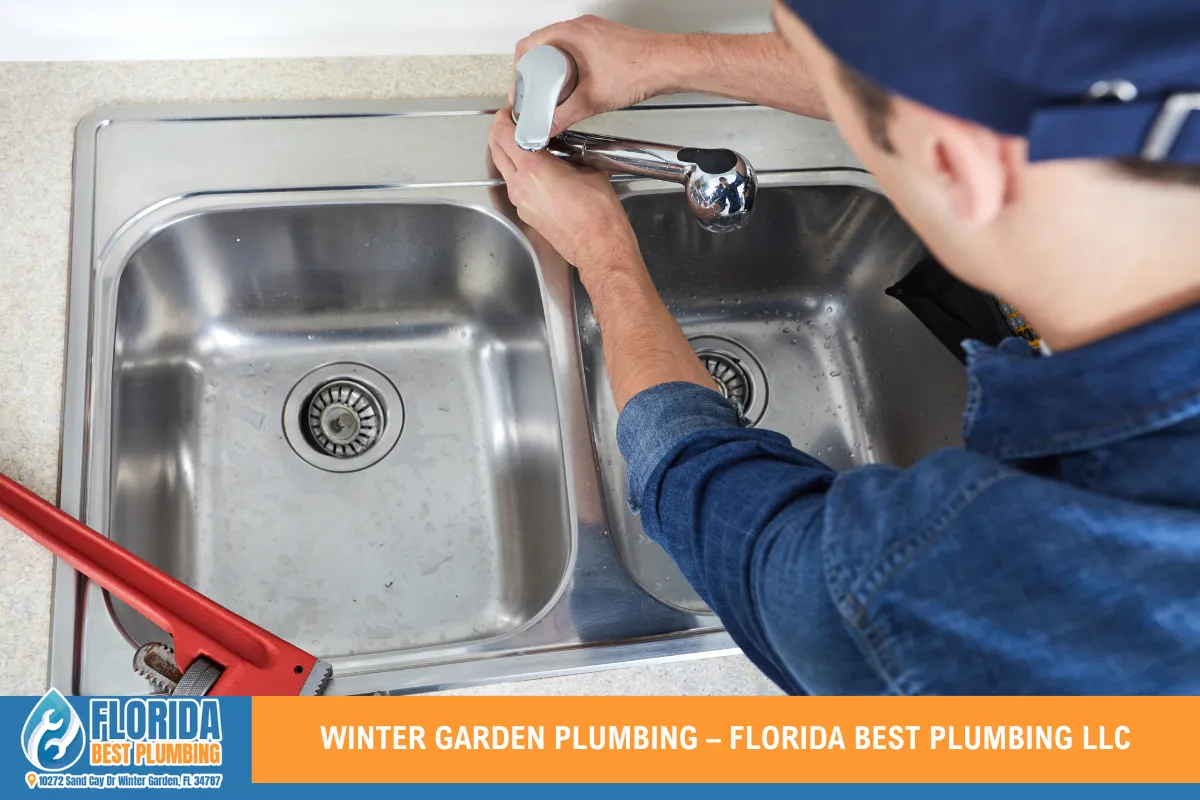
Looking for reliable plumbing services in Winter Garden? Florida Best Plumbing LLC is here to help! Whether you’re dealing with a stubborn clog, a leaky pipe, or planning a full plumbing upgrade, our experienced team has you covered.
We handle everything from emergency repairs to full system installations—quickly, professionally, and at a fair price. Call (407) 683-6644 anytime. Your home deserves plumbing that works the first time, every time.
Frequently Asked Questions (FAQ)
What are the most common types of pipes used in residential plumbing?
Home plumbing systems can include a broad range of pipe types, each suited for specific tasks. Here’s a breakdown:
- PVC pipes (polyvinyl chloride): Common in drain lines and sanitary lines due to durability and resistance to corrosion.
- Copper pipes are often used for hot water delivery because they’re heat-resistant and long-lasting.
- Galvanized pipes, once a standard, are now less common due to the risks of corrosion over time.
- ABS pipes: Black plastic pipe used in older homes; similar to PVC but less flexible.
- Flexible pipe (PEX): Great for tight spaces, this inch pipe type is easy to install and works well in cold weather.
- Cast-iron pipe: Still found in some older homes, it is extremely durable but heavy.
- Braided pipe: Typically used for fixture connections, such as faucets or toilets.
Each plumbing pipe type is available in a range of sizes to match various applications, from water supply lines to drain systems.
Can PVC pipes handle hot water and cold weather conditions?
PVC pipes are incredibly popular in residential plumbing due to their affordability and ease of use. However, they come with some limitations:
- Hot water compatibility: Standard polyvinyl chloride pipes are not designed for high-temperature water. Prolonged exposure to hot water can weaken the pipe, leading to warping or cracking. For hot water lines, CPVC (chlorinated polyvinyl chloride) is a better alternative.
- Cold weather risks: In colder weather or during the winter months, PVC becomes more brittle. While it’s less likely to burst than copper pipes in freezing conditions, frozen PVC pipes can still crack if the water inside expands.
- Best use cases: Drain lines, vent systems, and some water pipes, excluding the hot water supply side.
Using proper insulation and selecting the right pipe size and material helps maintain plumbing system reliability through both hot summers and cold winters in Florida.
How do I choose the right pipe size and material for my plumbing project?
Selecting the right plumbing pipe depends on its purpose and local building codes. Start by understanding your system:
- Water supply lines: Use ½-inch or ¾-inch pipe, depending on the number of fixtures. Copper, braided pipe, or PEX flexible pipe are top choices.
- Drain lines: Larger pipes, typically ranging from 1½ to 4 inches in diameter, are used. PVC and cast-iron pipes are commonly used due to their durability.
- Sanitary lines: Require corrosion-resistant materials—typically PVC or ABS plastic pipe.
Galvanized steel pipe is rarely used today but may still be found in older homes. It’s important to replace it to avoid rust and water pressure issues. You’ll also want to:
- Use pipe cutters to ensure clean, accurate cuts.
- Match your fittings to the pipe material.
- Check compatibility with water heaters and hot water distribution.
Consult your local codes and consider the placement of your water meter to determine the required pipe sizes and materials for safety and efficiency. Read more: PEX Plumbing in Winter Garden, FL: Pros, Cons, and Best Use Cases
What Happens if I Delay Water Heater Replacement in Winter Garden, FL?
Water Heater Replacement in Winter Garden, FL [...]
Water Heater Replacement in Winter Garden, FL: Can an Old Water Heater Become a Safety Hazard?
Why Aging Water Heaters Are More Than [...]
Windermere Plumber: What is Involved in Repiping a Home?
A Fresh Start: Why Repiping Matters for [...]
Windermere Plumber: How Long Does It Take to Install a Water Heater?
Uncovering the Truth About Water Heater Installation [...]
Do I Need a Windermere Plumber to Replace a Toilet?
Why Hiring a Windermere Plumber Matters for [...]
Winter Garden Plumber: How Do Plumbers Fix a Clogged Kitchen Sink?
If you need a plumber in Winter [...]


